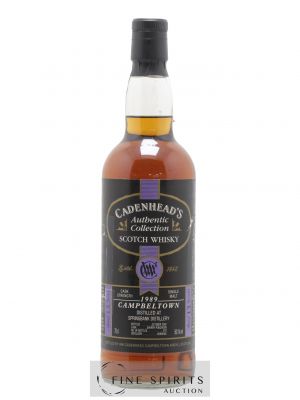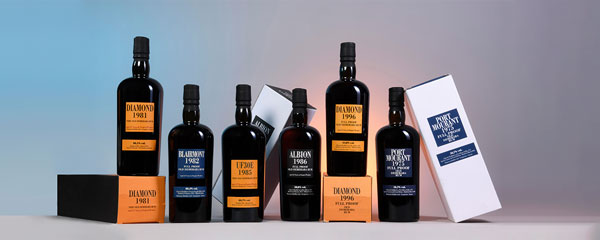Cuvée presentation
A single cask Springbank, distilled in 1989, aged in sherry casks and bottled in 2002. Cadenhead was founded in Aberdeen in 1842 by George Duncan. William Cadenhead then joined the company and, when George Duncan died in 1858, took over and renamed the business after himself. William’s nephew Roberth Duthie developed the company in the early 20th century and it remained a family business until 1969. William Cadenhead Ltd was then sold to the Springbank distillery’s owner J. & A. Mitchell and Co. Hedley G. Wright, a direct descendent of Archibald and John Mitchell, became William Cadenhead Ltd’s CEO. In the past, Cadenhead had mainly sold its own brands, such as Putachieside, The Hielanman, Seven Stars and Green Label rums. Under Hedley G. Wright, the company began to take more of an interest in single malts. This led to the creation of the legendary collection of dumpy bottles in 1977. This series of single malts stood out for its very gentle filtration, lack of artificial colouring, and relatively high bottling strength for the time (80 proof/45.7% ABV). The labels included lots of information, including the month and year of distillation and bottling, and whether or not sherry casks were used. Also in 1977, the business moved to another address in Aberdeen, and finally to Campbeltown. In the 1980s, Cadenhead sold casks to legendary bottlers such as Samaroli and Corti Brothers through the subsidiary Duthie’s. Finally, two new whisky ranges were created in 1991 and 1992, the Original Collection bottled at 46% and the Authentic Collection bottled at cask strength. Other special series to mark Cadenhead’s major anniversaries (150 and 175 years), as well as new ranges launched since (Small Batch, World Whiskies, etc.), have all contributed to the company’s ongoing history up to the present day. A limited edition of 570 bottles.
The distillery Springbank
Scotland, Campbeltown. Distillery operational. Owner: J&A Mitchell & Co Ltd
It is no coincidence that four of the fifteen most prized distilleries in Scotland are family-owned or independent. Throughout the 20th century, this status led them to seize on any commercial opportunity open to them and to develop the marketing ingenuity key to the development and sustainability of their businesses. The Springbank distillery is one of the finest examples of the villainy of the Scotch whisky industry in the 20th century.This is seen in two exceptional bottlings, one distributed in the early 70s, a 50 year old distilled on 29 December 1919 (stated on its certificate), and the other released in the early 90s, a re-bottling from the distiller, limited to 24 editions worldwide, also displaying the vintage 1919. It is also seen in a move made at the very start of the 2000s, when, under pressure from a stock hit hard by years of production crisis (1980s), the Mitchell family decided to drastically change the profile of their single malt, taking the opportunity to change the bottle at the same time.
Report a problem with this lot ? Report




